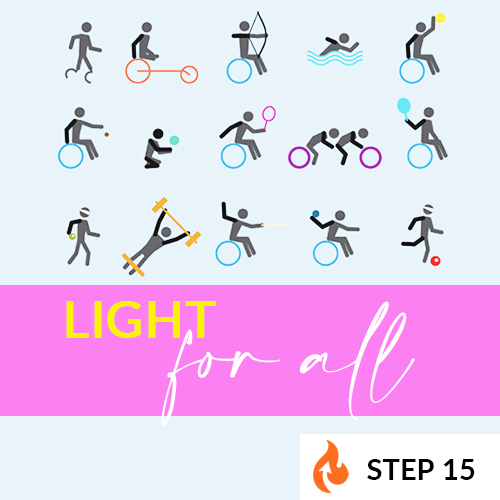All ability sports
August 28th to September 8th
France
Light for all peoples
“The servant returned to his master and reported these answers. The master of the house was angry and said to his servant, ‘Go quickly into the squares and streets of the city and bring here the poor, the crippled, the blind and the lame.” (Luke 14; 21)
Christ was invited to eat on the Sabbath with a Pharisee and others. Christ’s teaching here takes place among the religious leaders, with a person with a physical disability.
We see that Jesus provides physical healing for this man, then urges the meal guest to include the “poor, crippled, lame and blind” in his life.
Jesus notes that the other guests were striving for the most prestigious and important seats. The irony here cannot be overlooked. Jesus heals a man coming with a disability who was not invited to the meal. Rather than celebrating with this man during this miraculous intervention, inviting him to the table and hearing his story, the guests tried to gain recognition of their own importance by claiming the best seats.
Jesus tells them a parable about the places of honor at a wedding party.
In the parable of the wedding feast, the host has the last word on who gets the places of honor. In the minds of these Pharisees and spiritual leaders, the man with the disability was last and they were first. Jesus then reverses the order of the Kingdom of God. As soon as Jesus mentions the Kingdom of God, someone at the table quickly jumps to the theme of the “heavenly feast”. In the context of Jesus’ response it’s clear that the tone of the one who intervened was utterly pious and super-spiritual.
Just after being rebuked along with the others by Jesus for not looking after those with different abilities, this person attempted to give an answer regarding his position (and that of the other guests) in the great banquet of the kingdom.
This intervention added fuel to Jesus’ fire.
Turning to the man, Jesus reiterated in parable form what he had already said about “seats of honor” and “guest lists”.
Now, he taught that this “feast of the kingdom” would in fact be “filled” with those he had just spoken of, i.e. people in situations of poverty and disability.
In this parable, we see 2 groups of people:-
1) THOSE WHO COULD COME IF THEY WANTED TO
Those who could come to the party if they chose to accept the invitation. That is, all those who had a whole host of excuses, who made other choices in their already busy lives.
2) THOSE WHO WOULD COME IF THEY COULD
Those who would come right away if they were invited. People in marginalized situations, poverty, disability. Those who would come without hesitation, if helped to come, who would gladly accept the invitation if invited.
For us, this is an image of Christian mission. This is the fullest dimension of the task of the Church, of the Christian sports movement, of the people of God: to commit to sharing the Gospel with everyone, not just with some.
The Bible always acts as a mirror in which we must see our churches and ministries reflected. So let’s examine ourselves in the light of God’s Word:
- In our efforts to make disciples, what groups of people have we focused on so far?
- What does this biblical passage look like in our mission contexts?
- In Matthew 28:19 Jesus commands us to “Go to all peoples so that people may become my disciples”. Will our obedience translate into inclusive mission?

Specific prayer for people with disabilities:
Our Father, we confess our negligence in making disciples among those with disabilities. We now receive your forgiveness and grace. We thank you for all the different individuals in our communities, many of whom face real trials, weaknesses, physical or mental challenges. All are unique, individually known and loved by you. Help us to love them as you love them, and to reach out to them too with the word of life that is your gospel, good news for all.
Father in heaven, we place our trust in you, the God of the universe, who holds all things in your hands, who created everything for your own glory, whose eternal plan for the world extends to and includes each of us as individuals.
Jesus, Son of God, we put our trust in your word. In the parable of the great banquet that you gave us, you speak of a master who declares that everything is ready and that a second mission to the streets is needed. Lord, we pledge our allegiance to you, because you know what you’re doing, and you’re always trustworthy. So we will trust and obey your call.
Holy Spirit, we recognize that you too, like the Son, are always concerned with the Father’s concerns. As we set out to make disciples in this part of the vineyard, guide us and help us. AMEN.
Personal introduction : Steve Jones is an Evangelical Baptist minister in Wales and works worldwide for The Fellowship of Christian Athletes. He also serves as a coach for the Paralympic sport of goalball (a sport for the blind and visually impaired) and as Christian chaplain to a wheelchair rugby team in his home country.
![]()
Project coordination : Fred Menigoz
Illustrations/conception : Catherine Jegu
Translations : Maelle Moungounga, Caroline Sans, Tom Hawkins.

Project coordination : Fred Menigoz
Illustrations/conception : Catherine Jegu
Translations : Maelle Moungounga, Caroline Sans, Tom Hawkins.
